
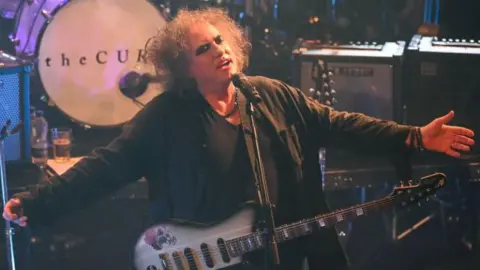 BBC
BBC
The Cure played an intimate concert for Radio 2 earlier this week, which will be broadcast on BBC Two this weekend
The Cure frontman Robert Smith says performing songs from the band's newly-released album, Songs Of A Lost World, helped him deal with the grief of losing close family members in recent years.
Speaking to BBC Radio 6 Music's Huw Stephens, he said singing live became "hugely cathartic" in escaping the "doom and gloom" he felt.
"You just suddenly feel something. You feel connection," he added. "And that's the reason why I still do it... that communal moment with a crowd. There's something really, really wonderful about it."
The band performed a live session before also playing a Radio 2 In Concert set to a small audience at the BBC Radio Theatre on Wednesday.
The London show included a performance of Alone – the group's first new music in 16 years and the lead single from Songs Of A Lost World, released this Friday.
The long-awaited record is the follow-up to 2008’s 4:13 Dream and has been in production since 2019, following the band's 40th anniversary shows.
Smith expressed relief at finishing the process, telling Stephens that completing song lyrics he deems worthy has become more difficult with age.
"It's the one thing that as I've grown older, I’ve found much much harder to do - write words that I want to sing. I can write words but I don't really feel like singing them.
"So to arrive at that point where I think that it's worth singing these songs, it has become really, really hard,” he said.
He revealed that his wife Mary, who he met at secondary school, helped him finalise the album's tracklist, insisting that he balance the depth of the darkness.
"I was finishing the doom and gloom ones... and [Mary] said no, no, no your best albums are the ones that just have a couple of... more upbeat tracks. She was right.
"I wanted to finish everything, because I thought that's only fair to all the songs, like they're all little children - I don't want to pick favourites."
Originally formed in Crawley, West Sussex in 1978, The Cure continue to endure as alternative rock’s goth icons - pitching lyrics of love, angst and desolation against a kaleidoscope of melodies.

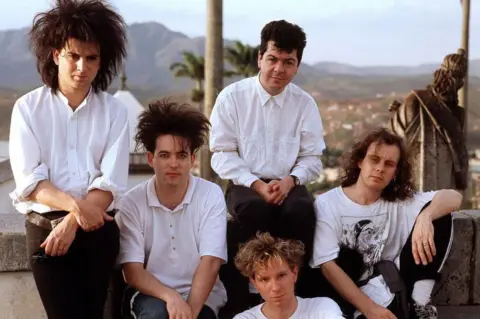 Getty Images
Getty Images
The Cure in 1987, with present bassist Simon Gallup (far left) sitting next to vocalist Robert Smith, the band's only constant member, who still sports the same trademark big hair today
From early years of rock sparsity - pulling apart the remnants of Joy Division's post-punk gloom and David Bowie's Low era - they bloomed into late-80s indie-pop heavyweights - defined by Smith's melancholy.
This era spawned a number of UK top 10 singles, including Lullaby and Friday I'm In Love - one of the band's best-known tracks from their chart-topping 1992 album, Wish.
Guitarist and principal songwriter Smith remains the band’s only constant member, closely followed by long-time bassist Simon Gallup.
Reeves Gabrels and Perry Bamote currently tour on guitar, with Jason Cooper on drums and Roger O'Donnell on keyboard.
But it is Smith's imprint that dominates on Songs of A Lost World - the band's 14th album.
Featuring songs written as far back as 2010, events of recent years have given it a personal feel, with Smith mourning the loss of family members, including his late brother, Richard.
His death inspired the track I Can Never Say Goodbye - a window into grief-stricken frustration and regret.
When the track made its way into new songs included in last year's tour, Smith often had trouble completing it without becoming overwhelmed with emotion. He told Stephens that "performing the track night after night" eventually became a "wonderful moment".
Speaking to Matt Everitt in an interview for the latest issue of Uncut magazine, since published on the band's YouTube channel, Smith explained these real-life touchstones came to define the record and set it apart from earlier albums.
"When you’re younger, you romanticise [death], even without knowing it. Then it starts happening to your immediate family and friends and suddenly it’s a different thing," he said.
"It’s something that I struggled with lyrically: how to put this into the songs? I feel like I am different person than I was when we last made an album. I wanted that to come through."

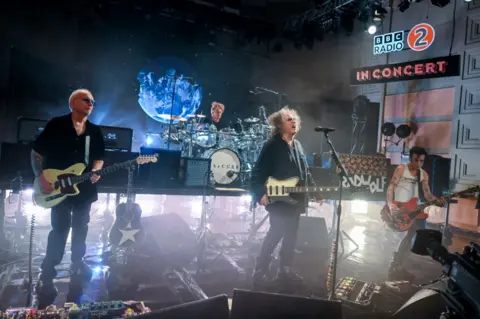
The Cure performed in support of their first album in 16 years, Songs Of A Lost World
This sense of fragility and awareness of mortality runs throughout, as Smith, now 65, faces the passage of time with newfound urgency.
Its darkness and atmospherics mirror 1982's Pornography and 1989's critically-acclaimed Disintergration. However, Songs of A Lost World is much tighter in length, with only eight tracks - almost half the runtime of those albums.
Reviews from critics have been positive, hailing Songs Of A Lost World as a return to form.
The Telegraph awarded five stars, with Neil McCormick describing it as "perversely uplifting in its nihilism and the best thing since their debut". The Guardian’s four-star review praised the record’s introspective depth, particularly how it wrestles with “the question of Smith’s own selfhood”.
“It seems to be fracturing”, wrote Kitty Empire, despite fans’ supposed clear image of one of British rock’s iconic figures. She also highlighted the unexpected pop banger, Drone: Nodrone - one of Mary’s picks - as the album’s “crowning glory”.
These themes culminate on the album's closer, Endsong, an 11-minute epic that stood out as a highlight of the band's Radio 2 In Concert performance on Wednesday - broadcast on BBC Radio 2, iPlayer and BBC Two this Saturday.
Formed around a thudding, slow drum beat, the guitars build to a fully-formed crescendo of whirling tones and unrelenting bass hooks, similar to 1992's Cut.

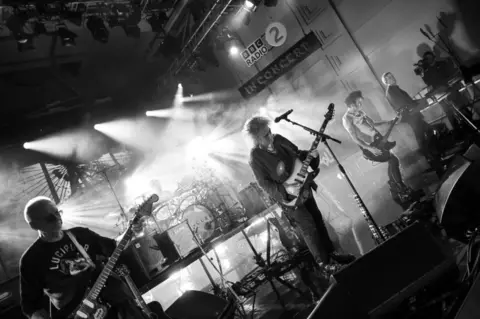
The Cure performing during their 6 Music session for Huw Stephens' show
Lyrically it finds Smith looking back on his own life, "remembering the hopes and dreams I had"; wondering what happened to the "small boy", and how he "got so old".
Classic melancholy on paper perhaps, but live it sounds brutally honest, unapologetically raging and resigned in equal measure.
Elsewhere, the mood of the set was celebratory and very much alive: filled with fan favourites and greatest hits, from the languid heartbreak of Pictures of You to the poppier sounds of Inbetween Days and Just Like Heaven.
The band themselves also appeared in good spirits, exchanging smiles, with Smith playfully dancing around during the encore that included Close To Me and Lullaby.
Joy in the face of new material that, in places, sounds darker than ever should perhaps come as no surprise.
"I've hated the idea of having a set time for a career", Smith told the NME in 1983 as he turned 25. "I think it’s terrible. I suppose it’s because I’m getting older and feeling my age."
Smith recently suggested to The Times that the band may come to an end around their 50th anniversary in 2029, by which time he will be 70.
Speaking to Stephens, he suggested, with a dry laugh, that he's "not going to get" to that milestone age and would instead be "really happy" to see Christmas.
But Smith told Uncut that the band have three albums near-completion following their intensely productive 2019 recording sessions.
He adds to Stephens that he's "almost there" with the second album. "Once I’ve done that, then I shall take a deep breath and then I’ll look up, but until I finish it I’m not bothering about what comes next."
Time waits for no-one, but Smith and The Cure are certainly not ready to stand still.
Set list
Radio 2 In Concert:
AlonePictures Of YouA Fragile ThingHighA Night Like ThisLovesongThe WalkInbetween DaysJust Like HeavenFrom The Edge Of The Deep Green SeaEnd SonEncore
LullabyFriday I’m In LoveClose To MeWhy Can’t I Be You?BBC Radio 6 Music session
PlainsongLast DanceI Can Never Say GoodbyeBurnAnd Nothing is ForeverAt NightA ForestAll I Ever AmPrayers for RainDisintegration
 Movie
Movie 1 month ago
51
1 month ago
51 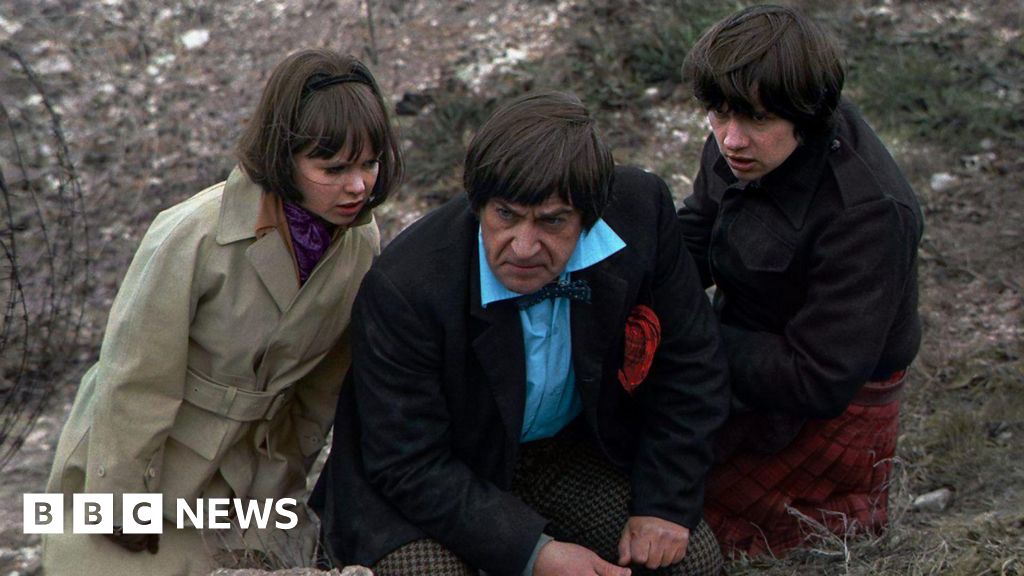
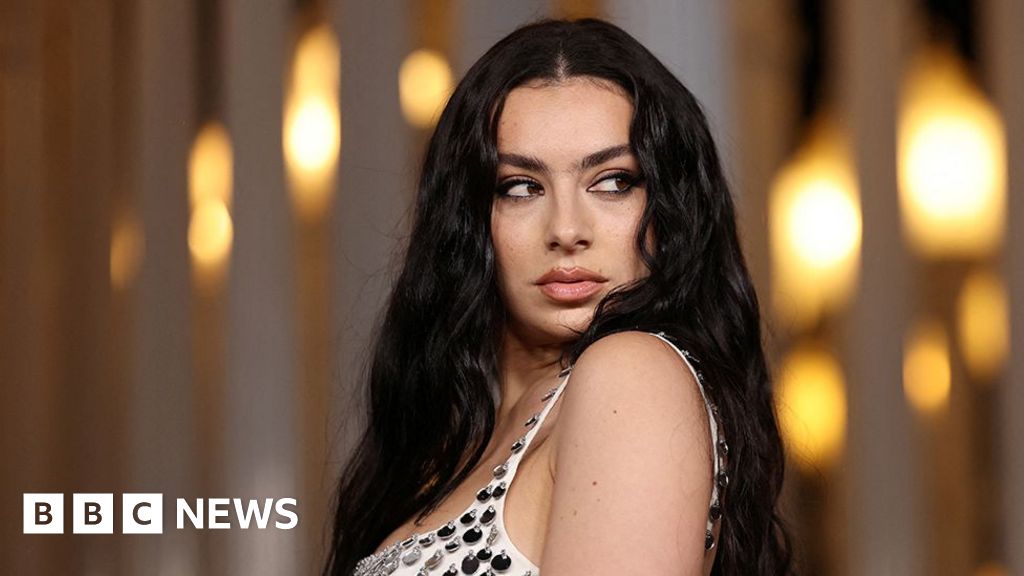
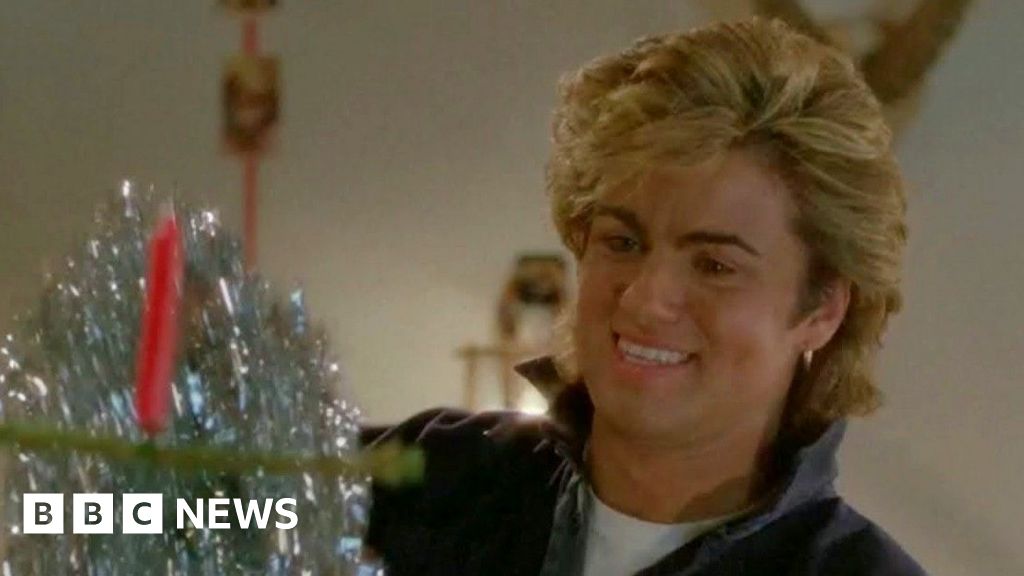


![Presidents Day Weekend Car Sales [2021 Edition] Presidents Day Weekend Car Sales [2021 Edition]](https://www.findthebestcarprice.com/wp-content/uploads/Presidents-Day-Weekend-car-sales.jpg)



 English (United States)
English (United States)